Rabbits Hay for your rabbit!
- Ordered before 5 p.m., shipped the same day!
- Al 14 jaar een begrip!
- Delivery from our own stock
- Ordered before 5 p.m., shipped the same day!
- Al 14 jaar een begrip!
- Delivery from our own stock
Order Rabbit Hay easily and quickly at DRD Knaagdierwinkel® The online Rabbit Webshop for all your Rabbit supplies
For rabbit hay you have come to the right place in our rabbit webshop!
Rabbits are known for their cute appearance and cuddliness. They are popular as pets because of their friendly nature and ease of maintenance. But to really keep your bunny healthy and happy, proper nutrition is essential. And that's where hay plays a crucial role.
It may seem simple, but rabbits are picky eaters. That's why it's vital to understand why hay is so important for rabbits, what types of hay are available and how to ensure your furry friend gets the right nutrition.
In this comprehensive article, we delve deeper into the world of rabbit hay and discover why it should be the cornerstone of their diet. From the nutritional value to the different types and flavors, we cover everything you need to know to offer your rabbit a healthy and happy life.
The Rabbit's Stomach and the Importance of Hay
To understand why hay is so important to rabbits, let's first look at the anatomy of their digestive system. Rabbits have a unique stomach structure, and their digestive process differs greatly from that of humans and other pets.
A rabbit's stomach is what we call a "full stomach." This means that a rabbit's stomach has little muscle and is unable to process and propel food efficiently. Instead, a rabbit's digestive system is geared to handle small, frequent portions of food. A rabbit eats an average of 80-120 small portions of food per day. It follows that their diet should consist mainly of hay.
In a rabbit's large cecum, also known as the "fermentation chamber," the fine dietary fibers of the hay are converted into proteins, vitamin B and vitamin K by special bacteria. The result of this process is the so-called cecal droppings. These droppings have a grape shape and are surrounded by a mucus layer. What makes this process even more fascinating is that rabbits eat these droppings. This behavior is known as caecotrophy and is essential for their health.
Cecal droppings are rich in nutrients and are re-digested to ensure that all nutrients are fully utilized. This complex digestive process is vital for rabbits, and it is why hay is an indispensable part of their daily diet.
The Nutritional Value of Hay for Rabbits
Now that you understand why hay is so important for rabbits, let's look at its nutritional value. Hay is much more than just a filler for a rabbit's stomach; it contains essential nutrients that contribute to their overall health.
Fiber: Hay is an excellent source of dietary fiber. Fiber is crucial for healthy digestion in rabbits. They help prevent constipation and other digestive problems. In addition, fibers contribute to the wearing down of rabbits' teeth, which is essential because their teeth continue to grow throughout their lives.
Protein: Although hay contains less protein than other foods rabbits eat, it is still a valuable source of protein. It contributes to a rabbit's overall nutritional balance and supports their muscle development and body functions.
Vitamins and Minerals: Hay contains important vitamins and minerals that promote the health of rabbits. This includes vitamins A, D and E, as well as minerals such as calcium and phosphorus. These nutrients are vital for proper growth and maintenance of bones, skin and coat.
Enrichment with Herbs: There are various types of hay available that are enriched with herbs. These herbs add extra flavor and nutritional value to the hay, which diversifies and enriches your rabbit's diet.
Now that you know about the nutritional value of hay for rabbits, it's clear why it should be the foundation of their diet. Hay provides the essential fiber, protein and nutrients needed for a healthy and balanced diet for rabbits.
Types of Rabbit Hay and What They Mean
When it comes to choosing hay for your rabbit, you will find that there are different types available. Each type of hay has its own characteristics and benefits. Here are some of the most common types of hay and what they mean:
- Timothy Hay : Timothy hay is one of the most popular choices for rabbit hay. It has an excellent balance of fiber and nutrients, making it ideal for most rabbits, especially adults.
- Pasture hay : This hay is harvested from natural grasslands and is rich in variety. Meadow hay is suitable for rabbits that like variety.
- Herbal hay : Hay that is enriched with various herbs, such as chamomile, dandelion and fennel, adds flavor and variety to your rabbit's diet. In addition, some herbs have specific health benefits.
- Alfalfa : Alfalfa contains more protein and calcium than other types of hay, and it is more suitable for young, growing rabbits and pregnant or lactating does.
The type of hay you choose depends on your rabbit's needs and their personal preferences. It's a good idea to try different types of hay to see which one your rabbit likes best. Introducing variety to their diet can help them stay healthy and happy.
The Importance of Fresh and Quality Hay
In addition to understanding the different types of hay, it is important to know that the quality of the hay affects the health of your rabbit. Fresh and quality hay is essential.
Freshness: Hay should be fresh, without mold or unwanted contaminants. Make sure you store hay in a dry and clean place to maintain freshness.
Dust-free: Dust in hay can cause respiratory problems in rabbits. Choose hay that is as dust-free as possible and shake it before use to remove excess dust.
Green Color: Although hay is usually dry, it should still have a green color. This indicates freshness and retention of nutritional value.
The hay you choose should be of high quality and suitable for rabbits. At DRD Knaagdierwinkel ® we strive to offer only the best hay, so you can rest assured that your rabbit is provided with the high-quality hay they need for a healthy and happy life.
Hay as food and rodent material
Hay is not only a source of nutrition for rabbits, but also an essential gnawing material. Rabbits have a natural need to gnaw, and hay provides this perfectly. The continuous chewing motion associated with eating hay helps wear down your rabbit's teeth, which is vital as their teeth continue to grow throughout their lives.
Providing sufficient gnawing material helps prevent dental problems, such as hooks on the molars and other problems with your rabbit's teeth. In addition, gnawing on hay can reduce boredom and stress, which in turn improves your rabbit's overall health and well-being.
Hay serves not only as food for rabbits, but also as an essential source of entertainment and dental care. It's a natural way for rabbits to wear down their teeth and enjoy a tasty meal at the same time. It also prevents them from getting bored, as gnawing on hay is one of their favorite activities.


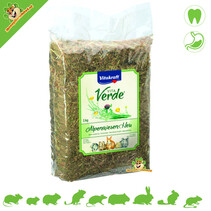







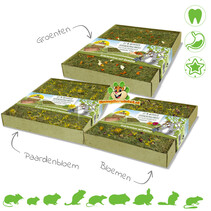
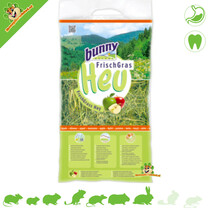
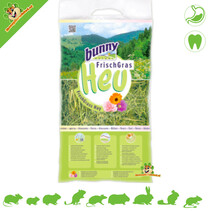
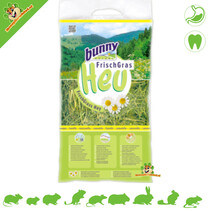
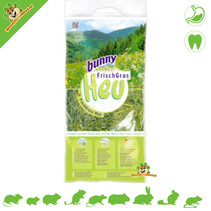


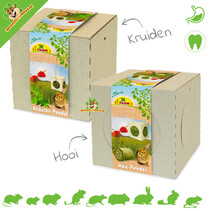
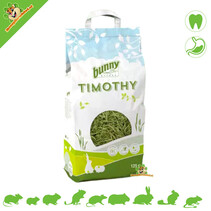
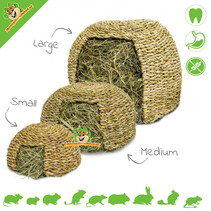

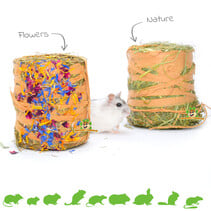

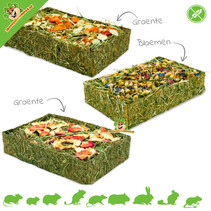


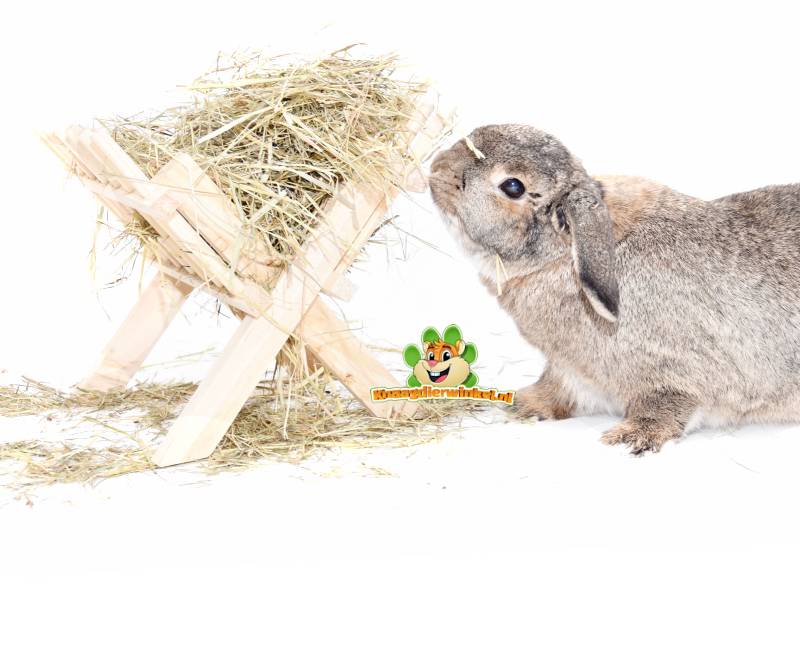
 Save
Save